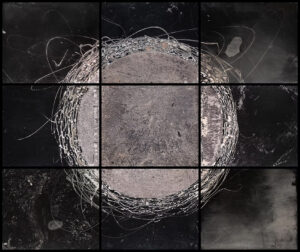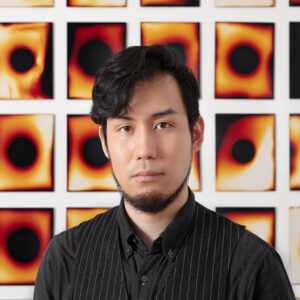Monday, October 20, 5:30 – 7 PM, Crow’s Nest, 116 W. Mulberry Street, Baltimore, van transportation will be available from UMBC, please RSVP

Founded in 2024 by Leo Martinez-Diaz, Crow’s Nest is an art incubator in Baltimore that provides studio, social, and exhibition space for artists seeking to address the twin challenges of climate change and environmental justice through artistic expression and cultural production. In summer 2025, the Crow’s Nest launched the Extreme Heat Fellowship to support the work of three Baltimore-based artists, Rowan Bathurst, Kei Ito, and Rachel Stein to address the growing public health threat of extreme heat in Baltimore and in urban areas around the world. The three fellowship winning artists were given studio space, honoraria, and opportunities to work with researchers in the Department of Earth and Planetary Sciences at Johns Hopkins University. The artists will present their resulting works in artist talks and in an accompanying exhibition at Crow’s Nest.
 Rowan Bathurst is a painter living and working between Baltimore and São Paulo, Brazil. Her practice centers on portraiture, primarily depicting women, drawn from her own photographs of close friends and incorporating landscapes and visual elements inspired by her time living in rural Brazil and travels across continents. Nature and history are fundamental to her practice and her work encourages viewers to reflect on the narratives we inherit and carry forward. Bathurst earned her BFA in Painting and Art History from the Maryland Institute College of Art in 2018. Her work has been exhibited and collected both locally and internationally in solo and group exhibitions. In 2022, she was nominated as a participating artist for The Rema Hort Mann Foundation. Alongside her studio practice, she engages in public art and mural work worldwide.
Rowan Bathurst is a painter living and working between Baltimore and São Paulo, Brazil. Her practice centers on portraiture, primarily depicting women, drawn from her own photographs of close friends and incorporating landscapes and visual elements inspired by her time living in rural Brazil and travels across continents. Nature and history are fundamental to her practice and her work encourages viewers to reflect on the narratives we inherit and carry forward. Bathurst earned her BFA in Painting and Art History from the Maryland Institute College of Art in 2018. Her work has been exhibited and collected both locally and internationally in solo and group exhibitions. In 2022, she was nominated as a participating artist for The Rema Hort Mann Foundation. Alongside her studio practice, she engages in public art and mural work worldwide.
 Kei Ito is an interdisciplinary artist whose work is centered around utilizing the conceptual framework of photography to visualize the invisible. Mainly employing camera-less photographic techniques, performance, and artifacts, Ito creates large-scale installations and a variety of photographic projects that excavate hidden histories. As a third-generation atomic bomb victim living in the US, Ito employs his generational history as a series of case studies, initiating a journey of healing and growth while inviting audiences to explore nuanced social issues and honor the memories of those lost to both historical and contemporary tragedies. For the Extreme Heat residency, he is building on the core of his practice through an environmentalist lens. Ito’s artistic contributions have been widely recognized and exhibited in both solo and group exhibitions. His pieces are held in institutional collections including the Museum of Contemporary Photography, Norton Museum of Art, Gregory Allicar Museum of Art, Eskenazi Museum of Art, and Georgia Museum of Art.
Kei Ito is an interdisciplinary artist whose work is centered around utilizing the conceptual framework of photography to visualize the invisible. Mainly employing camera-less photographic techniques, performance, and artifacts, Ito creates large-scale installations and a variety of photographic projects that excavate hidden histories. As a third-generation atomic bomb victim living in the US, Ito employs his generational history as a series of case studies, initiating a journey of healing and growth while inviting audiences to explore nuanced social issues and honor the memories of those lost to both historical and contemporary tragedies. For the Extreme Heat residency, he is building on the core of his practice through an environmentalist lens. Ito’s artistic contributions have been widely recognized and exhibited in both solo and group exhibitions. His pieces are held in institutional collections including the Museum of Contemporary Photography, Norton Museum of Art, Gregory Allicar Museum of Art, Eskenazi Museum of Art, and Georgia Museum of Art.
 Rachel Stein is an interdisciplinary artist and educator who aims to activate the mind and body through immersive installation that encompasses video, photography, soundscapes, and interactive sculpture. Rather than trying to return to a pristine world, her work provides alternative ways of being-with the waste and pollution that we inherit. She invites viewers to question their own consumer reality and relationship with pleasure through sensory stimuli. Rachel received an MFA in Studio Art at Maryland Institute College of Art in 2024. Her work has recently been exhibited at Towson University, Maryland Hall, and DoodleHatch Interactive Art Museum. She is a recipient of the Leslie King Hammond Fellowship from Maryland Institute College of Art and the Secondary Art Educator Award from the Maryland Art Education Association. As an extension of her art practice, Rachel teaches high school art and photography in Howard County.
Rachel Stein is an interdisciplinary artist and educator who aims to activate the mind and body through immersive installation that encompasses video, photography, soundscapes, and interactive sculpture. Rather than trying to return to a pristine world, her work provides alternative ways of being-with the waste and pollution that we inherit. She invites viewers to question their own consumer reality and relationship with pleasure through sensory stimuli. Rachel received an MFA in Studio Art at Maryland Institute College of Art in 2024. Her work has recently been exhibited at Towson University, Maryland Hall, and DoodleHatch Interactive Art Museum. She is a recipient of the Leslie King Hammond Fellowship from Maryland Institute College of Art and the Secondary Art Educator Award from the Maryland Art Education Association. As an extension of her art practice, Rachel teaches high school art and photography in Howard County.
This event is co-sponsored by CIRCA and the Department of Geography and Environmental Systems at UMBC. This event is open for full participation by all individuals regardless of race, color, religion, sex, national origin, or any other protected category under applicable federal law, state law, and the University’s nondiscrimination policy.